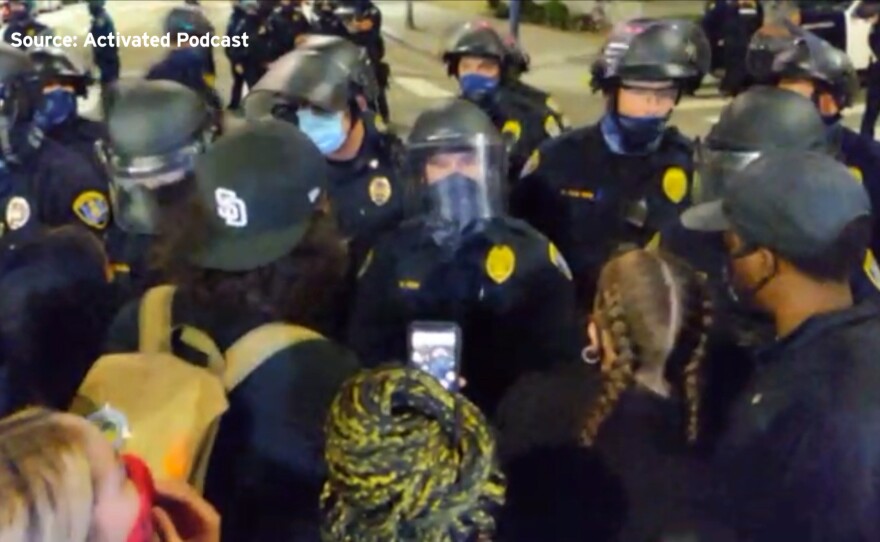A man arrested during a protest in downtown San Diego at the end of August is still in jail and is being held on $750,000 bail — an unusually high amount for an arrest during a protest, according to legal experts.
Denzel Draughn was arrested along with nine others during a protest in downtown San Diego on Aug. 28. Police allege he picked up a can of pepper spray dropped by an officer and sprayed it at a group of officers who were working the protest.
Police charged Draughn with nine felony counts of obstructing an officer and nine felony counts of illegally using tear gas, plus one felony count of possession of tear gas. He’s being charged nine counts for the first two charges because there were nine officers hit with tear gas, said police spokesman Lt. Shawn Takeuchi.
Those charges would normally result in a total bail of $380,000, but police asked for almost double that. His $750,000 bail is on par with kidnapping — normally $500,000 bail; or murder, normally $1 million bail.
Takeuchi said police requested the bail be increased for Draughn because they allege he is a danger to officers and a flight risk.
But Draughn's lawyer and fellow protesters say he is a high-profile local activist and the large bail is meant as a form of retaliation.
RELATED: Police Accountability Files
"They threw the book at him because they see him as the enemy because he's part of the Black Lives Matter Movement," said his attorney Lillian Lawrence, a civil rights lawyer who is representing him pro bono. "He is a hero and they're trying to villainize him for standing up for something everyone should be standing up for."
Takeuchi disputed any accusations that police were retaliating against Draughn because he's been a leader in other protests.
"We don't know his prominence, there's no way for us to know that information, this wasn't a targeted interaction," he said. "We don't know his organization or hierarchy, we wouldn't have that information."
Among others questioning the bail amount is Michael Semanchik, the managing attorney for the California Innocence Project, which represents incarcerated people on a pro-bono basis.
"It seems high given the situation that's unfolded here," Semanchik said. "It's not three-quarters of a murder, not a kidnapping."
Draughn’s lawyers can attempt to reduce his bail at his arraignment, which is scheduled for next week, Semanchik said. They could do so by showing he's not a danger to the community and by demonstrating he's not a flight risk.
RELATED: It's Never Stopped: Racial Injustice Ignites Protests Across San Diego
"But he's been sitting in jail this whole time pretrial," Semanchik said. "If he has funds, he could post the bail, but he'd have to come up with $75,000. That's not an easy amount of money to come up with."
Takeuchi said he wouldn't go into Draughn's criminal history or reasons why police believed he would try to run away.
"He did commit a violent act toward several officers (during the protest), so we believe he would do that in the future if released," he said.
Tasha Williamson, an activist who was at the protest where Draughn was arrested, said she feels he's being targeted because he's Black.
"They're holding him longer as a retaliatory measure," she said. "Police use excessive force, but then when anyone uses force on them, you don't get to claim that you're a victim."







